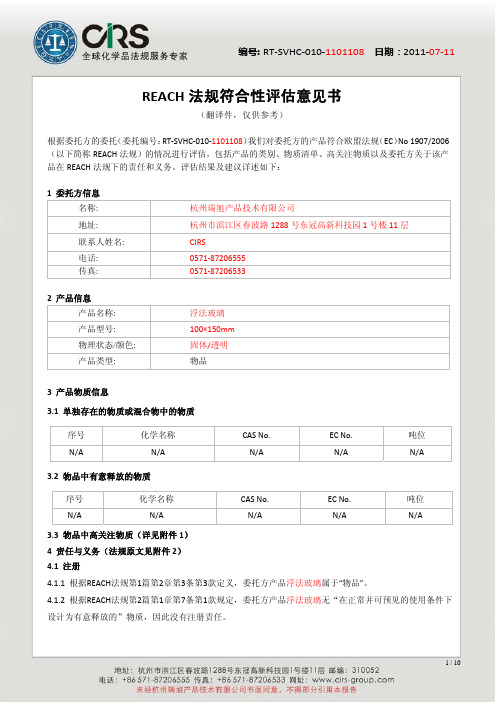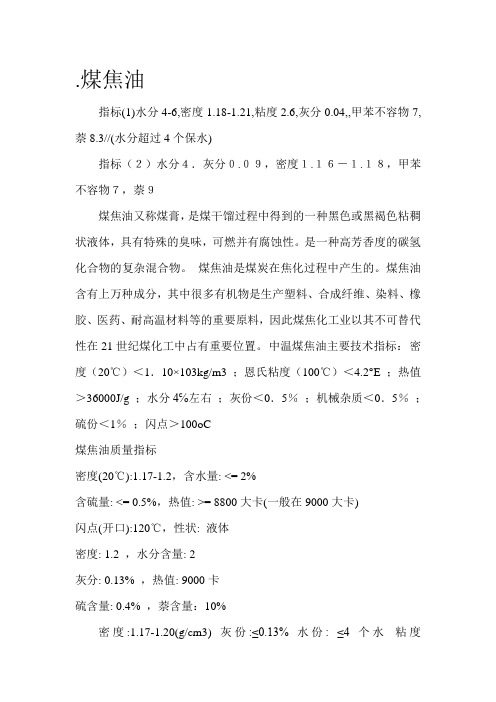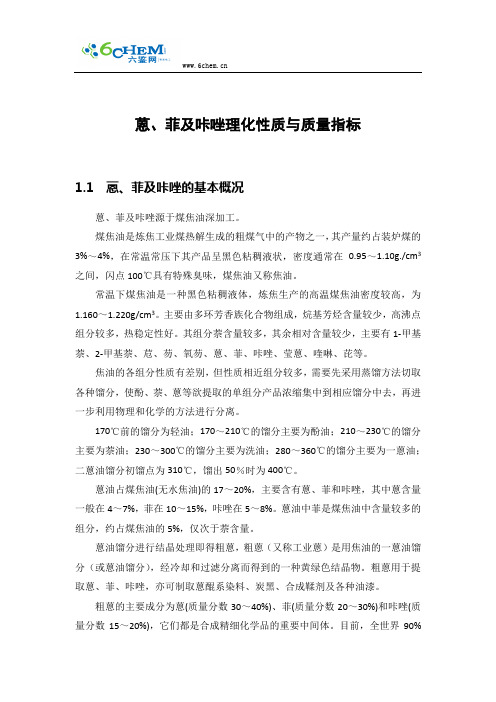蒽油蒽糊的定性及定量
蒽酮比色定糖法

实验题目:蒽酮比色定糖法一、目的与要求掌握蒽酮比色法测糖的原理和方法。
二、实验原理1糖的定性和定量测定的主要依据均基于糖分子结构中的四种结构特点:①含有自由醛基和酮基的还原性;②分子内的醛缩水成糠醛或甲基糠醛与萘的成色反应;③邻位的醛、醇成脎后熔点分析及结晶体分析;④糖醇羟基的甲基酯化后气相色谱分析;2蒽酮比色法是一个快速而简便的定糖方法,可用于测定糖原的含量,也可用于测定葡萄糖的含量。
3蒽酮的性质○1淡黄色针状晶体,不溶于水,溶于乙醇。
不溶于冷氢氧化钠溶液,加热时溶解成蒽酚的碱金属盐。
它的乙醇溶液呈蓝色荧光。
○2蒽酮可以与游离的已糖或多糖中的已糖基、戊糖基及已糖醛酸起反应,反应后溶液呈蓝绿色,在620nm处有最大吸收。
4糖的水解性质糖类能被强酸水解,能脱水生成糖醛或其他衍生物。
糖类与硫酸反应脱水生成羟甲基呋喃甲醛,生成物即可与蒽酮缩合成蓝绿色化合物,其颜色深浅与溶液中糖的浓度成正比,可比色定量。
三、实验材料、主要仪器和试剂器材:50ml容量瓶(一个) 、10ml离心管、10ml试管、离心机(公用)、移液器、可见分光光度计(723型)、电子分析天平、水浴锅、电炉、胶头滴管试剂:蒽酮试剂(现配)、标准葡萄糖溶液(0.1mg/ml)、30%KOH 、60%酒精、1M H2SO4 、酚红指示剂、1M NaOH四、操作步骤1标准曲线的制作2样品糖元的测定○1糖原的分离2-3g左右猪肝匀浆放入10ml离心管,加入2ml30%KOH,充分混匀;沸水浴加热20min,管内开始沸腾后取出(注意避免突然气泡,以免损失);冷却,离心(3000r/min 10min),去上清液;下层沉淀用60%酒精洗两次,每次洗完离心(3000r/min 10min)、去上清液;将上述离心管置于沸水浴中,驱尽酒精,获得糖原○2糖原的水解分离得到的糖元加1ml蒸馏水和1ml H2SO4(1M)、沸水浴加热1.5h,盖紧瓶盖以减少蒸发取出冷却后,将离心管中溶液倒入50ml容量瓶中,以少量水多次洗涤离心管,洗液一并加入量瓶中在量瓶中加入一滴酚红指示剂,用1M NaOH中和至淡黄色,pH试纸检测至中性,最后用水稀释至刻度线——待测葡萄糖的未知液○3样品液的测定:(1)加蒽酮时需要冰水浴5min冷却;(2)以1号试管作为调零管,2、3、4管的OD值取平均后从标准曲线上查出样品液相应的含糖量。
蒽油安全技术说明书

蒽油安全技术说明书第一部分:化学品名称化学品中文名称:蒽化学品英文名称:anthracene中文名称2:英文名称2:技术说明书编码:CAS No.:120-12-7分子式:178.22分子量:C14H10第二部分:成分/组成信息有害物成分:无资料含量:混合物CAS No :无资料第三部分:危险性概述危险性类别:易燃侵入途径:吸入、食入、经皮吸收健康危害:纯品基本无毒。
工业品因含有菲、咔唑等杂质,毒性明显增大。
由于本品蒸气压很低,故经吸入中毒可能性很小。
对皮肤、粘膜有刺激性;易引起光感性皮炎。
环境危害:对环境有危害,对水体可造成污染。
燃爆危险:本品可燃,具强腐蚀性、刺激性,可致人体灼伤。
第四部分:急救措施皮肤接触:脱去污染的衣着,用肥皂水和清水彻底冲洗皮肤。
眼睛接触:提起眼睑,用流动清水或生理盐水冲洗。
就医。
吸入:迅速脱离现场至空气新鲜处。
保持呼吸道通畅。
如呼吸困难,给输氧。
如呼吸停止,立即进行人工呼吸。
就医。
食入:饮足量温水,催吐。
就医。
第五部分:消防措施危险特性:遇明火、高热可燃。
与强氧化剂接触可发生化学反应。
有害燃烧产物:一氧化碳、二氧化碳。
灭火方法:消防人员必须穿全身防火防毒服,在上风向灭火。
灭火剂:干粉、二氧化碳、砂土。
用水可引起沸溅。
第六部分:泄漏应急处理应急处理:隔离泄漏污染区,限制出入。
切断火源。
建议应急处理人员戴防尘面具(全面罩),穿一般作业工作服。
不要直接接触泄漏物。
小量泄漏:避免扬尘,小心扫起,置于袋中转移至安全场所。
大量泄漏:收集回收或运至废物处理场所处置。
第七部分:操作处置与储存操作注意事项:储存于阴凉、通风的库房。
远离火种、热源。
库温不超过30℃,相对湿度不超过80%。
包装密封。
应与氧化剂分开存放,切忌混储。
配备相应品种和数量的消防器材。
储区应备有合适的材料收容泄漏物。
储存注意事项:密闭操作,注意通风。
操作人员必须经过专门培训,严格遵守操作规程。
建议操作人员佩戴自吸过滤式防尘口罩,戴化学安全防护眼镜。
REACH198项高关注物质(SVHC)2019REACH第二十一批次SVHC清单

REACH高度关注物质清单第一批 2008.10.28
第二批 2010.3.30
第三批 2010.6.18
第四批 2010.12.15
第五批 2011.2.21
第六批 2011.12.19
第七批 2012.6.18
第八批 2012.12.17
第九批 2013.6.20
第十批 2013.12.16
第十一批 2014.6.16
第十二批 2014.12.17
第十三批 2015.6.21
第14批 2015.12.17
第15批 2016.6.20
第16批 2017.1.12
第17批 2017.7.7
第18批 2017.12.20
HC第20批清单(7项)于2019年1月15日公布生效
1922,2-双(4-羟基苯基)-4-甲基戊烷6807-17-6401-720-10.005尚未在REACH下注册
193苯并[k]荧蒽207-08-9205-916-60.005尚未在REACH下注册194荧蒽206-44-0205-912-40.005尚未在REACH下注册
195菲1985/1/8201-581-50.005尚未在REACH下注册
196芘129-00-0204-927-30.005用作精细化学品生产转移中间体
1971,7,7-三甲基-3-(苯基亚甲基)双环[2.2.1]庚烷-15087-24-8239-139-90.005尚未在REACH下注册
H第21批清单(1项)于2019年2月7日通报列入SVHC
1984-叔丁基苯酚--持久性、生物
累积性和毒性
尚未在REACH下注册。
蒽油结晶点

蒽油结晶点1. 背景介绍蒽油(Anthracene oil)是一种煤焦化产物,主要成分为多环芳烃。
蒽油广泛应用于染料、医药、农药等领域。
其中,蒽油的结晶点是评估其品质的重要指标之一。
2. 结晶点的定义和意义结晶点是指在特定条件下,蒽油开始结晶并形成固体的温度。
它反映了蒽油中多环芳烃的溶解度和纯度,对于判断其品质和应用性能具有重要意义。
3. 测定方法通常使用差示扫描量热法(DSC)或光学显微镜法来测定蒽油的结晶点。
3.1 差示扫描量热法(DSC)差示扫描量热法是一种基于样品与参比物之间热量差异的测定方法。
通过将样品与参比物同时加热,并测量它们之间的温差,可以确定样品的结晶点。
在测定过程中,当样品开始结晶时,会释放出一定的热量,从而在DSC曲线上出现一个峰值,该峰值对应的温度即为蒽油的结晶点。
3.2 光学显微镜法光学显微镜法是一种通过观察样品在显微镜下的变化来测定结晶点的方法。
在测定过程中,将蒽油样品加热至一定温度,然后逐渐冷却并观察样品在显微镜下的变化。
当样品开始结晶时,可以观察到结晶核和晶体的形成,该温度即为蒽油的结晶点。
4. 影响因素蒽油的结晶点受多种因素影响,包括溶剂选择、纯度、含杂质等。
4.1 溶剂选择溶剂选择是影响蒽油结晶点的重要因素之一。
不同溶剂对于多环芳烃的溶解度不同,会影响蒽油在不同温度下开始结晶的情况。
通常使用苯作为溶剂来测定蒽油的结晶点。
4.2 纯度蒽油中杂质的含量会影响其结晶点。
纯度较高的蒽油结晶点较低,反之亦然。
因此,在生产过程中需要控制蒽油的纯度,以确保其结晶点符合要求。
4.3 含杂质除了纯度外,蒽油中其他有机物的含量也会影响其结晶点。
例如,若蒽油中存在大量芳烃类化合物,则可能使得其结晶点升高。
5. 结晶点与品质评估蒽油的结晶点是评估其品质和应用性能的重要指标之一。
通常情况下,较低的结晶点意味着蒽油纯度较高,适用于高要求的领域;而较高的结晶点则可能意味着蒽油纯度较低,适用性相对较差。
气质联用法测定REACH法规中的葸油蒽糊类物质

气质联用法测定REACH法规中的葸油蒽糊类物质
花金龙;潘伟;张玉莲;李巧
【期刊名称】《中国纤检》
【年(卷),期】2012(000)002
【摘要】以丙酮为溶剂,超声提取纺织品中蒽油蒽糊类物质含有的18种多环芳烃,建立了气相色谱一质谱联用的检测方法。
对色谱柱类型进行了选择,并优化了提取条件。
在最佳条件下,0.1μg/mL~10μg/mL之间18种多环芳烃均能成较好的线性,相关系数均大于0.996。
加入18种多环芳烃标准溶液的3个浓度水平
进行回收率试验,回收率相对较高,RSD%(N=6)均小于10%。
通过对多环芳烃的准确定量,再最终换算成蒽油蒽糊的含量。
该方法操作简便快捷、灵敏度高、实用性强。
【总页数】5页(P65-69)
【作者】花金龙;潘伟;张玉莲;李巧
【作者单位】广州市纤维产品检测院;广州市纤维产品检测院;广州市纤维产品检测院;广州市纤维产品检测院
【正文语种】中文
【中图分类】TS197
【相关文献】
1.欧盟将8类化学物质纳入需授权使用的“REACH法规”(附件14)清单中 [J], 元凤
2.从Ⅰ葸油中连续提取粗蒽的工艺研究 [J], 陈国平;李成;黄福林
3.气质联用法测定REACH法规中的有机酸酐 [J], 莫月香;黄昊来;罗峻;杨欣卉
4.气质联用法测定柠檬油与甜橙油中柠檬烯旋光异构体含量 [J], 陈磊; 杨程
5.气质联用法测定柠檬油与甜橙油中柠檬烯旋光异构体含量 [J], 陈磊; 杨程
因版权原因,仅展示原文概要,查看原文内容请购买。
蒽油中蒽含量的测定

十六、蒽油中蒽含量的测定方法1 范围本标准规定了蒽油中蒽的含量测定的原理、仪器、试剂、实验步骤和精密度。
本标准用于高温煤焦油经加工所制得的蒽油的蒽含量的测定。
2 标准性引用文件YB/T 5086—2005 工业蒽中蒽含量的测定方法3 原理及概要蒽和顺丁烯二酸酐在有机溶剂中起加成反应,用氢氧化钠标准溶液滴定过剩的顺丁烯二酸酐水解生成的酸,根据氢氧化钠标准溶液耗量换算成蒽含量。
本方法依据YB/T 5086—2005工业蒽中蒽含量测定方法进行优化改进,使其更适合于蒽油中蒽含量的测定。
在此方法基础上,将蒽油样称取量定于0.5 g—0.7 g,加入氯苯量增加到15 mL,可使滴定终点明显易辨,比直接依照YB/T 5086-—2005测定的平行样结果更接近,误差较小。
4 试验仪器4.1 蒽含量测定仪:4.1.1 锥形瓶:容积250 mL,带有标准磨口与水冷却管连接。
4.1.2 水冷却管:冷却管的有效长度300 mm±2 mm,外径25 mm±2 mm,内径14 mm±2 mm,下端有标准磨口。
4.2 研钵。
4.3 干燥器:内装干燥剂。
4.4 分析天平:感量0.0001 g。
4.5 秒表4.6 滴定管:容积50 mL。
4.7 平板电炉或煤气灯。
4.8 量筒:容积10 mL。
5 试验试剂5.1 顺丁烯二酸酐:分析纯5.2 氯苯:分析纯5.3 蒸馏水:不含二氧化碳5.4 酚酞指示剂溶液:1%乙醇溶液。
5.5 氢氧化钠标准溶液:分析纯,c(NaOH)=0.25 mol/L6 试验步骤6.1 分别称取0.5g—0.7g加热后混匀的蒽油试样和0.5 g经研细后在干燥器中干燥的顺丁烯二酸酐 (称准至0. 0002g),置于干燥洁净的锥形瓶中,沿瓶壁加入15mL氯苯,将附在瓶壁上的试样全部冲下。
6.2 将锥形瓶与干燥的水冷却管严密连接,加热,当气流上升到瓶颈时开始计时,保持微沸回流20min。
报告模板-中文(reach)

REACH 法规符合性评估意见书(翻译件,仅供参考)根据委托方的委托(委托编号:RT ‐SVHC ‐010‐1101108)我们对委托方的产品符合欧盟法规(EC )No 1907/2006(以下简称REACH 法规)的情况进行评估,包括产品的类别、物质清单、高关注物质以及委托方关于该产品在REACH 法规下的责任和义务。
评估结果及建议详述如下:1 委托方信息名称: 杭州瑞旭产品技术有限公司地址: 杭州市滨江区春波路1288号东冠高新科技园1号楼11层 联系人姓名: CIRS电话: 0571‐87206555 传真:0571‐872065332 产品信息产品名称: 浮法玻璃 产品型号: 100×150mm 物理状态/颜色: 固体/透明 产品类型:物品3 产品物质信息3.1 单独存在的物质或混合物中的物质3.2 物品中有意释放的物质3.3 物品中高关注物质(详见附件1) 4 责任与义务(法规原文见附件2)4.1 注册4.1.1 根据REACH 法规第1篇第2章第3条第3款定义,委托方产品浮法玻璃属于“物品”。
4.1.2 根据REACH 法规第2篇第1章第7条第1款规定,委托方产品浮法玻璃无“在正常并可预见的使用条件下设计为有意释放的”物质,因此没有注册责任。
序号 化学名称 CAS No. EC No. 吨位 N/AN/AN/AN/AN/A序号 化学名称 CAS No. EC No. 吨位 N/AN/AN/AN/AN/A4.2 通报委托方产品中检出的当前REACH法规第57条规定的高关注物质质量百分浓度小于0.1%,没有REACH法规第7条第2款规定的通报责任。
注:REACH法规的SVHC在物品中的含量限值0.1%是按照SVHC在整个物品中的含量计算的,但是六个国家(奥地利,比利时,丹麦,法国,德国和瑞典)对此方法提出质疑,0.1%的SVHC限值是按照在均质材料中的含量,该六个国家已经向ECHA以书面形式提出申请。
REACH

由于 高关 注度 物质 清单 中包 括 的物 质种 类 多 、理 化 性质差 别大。为 了避免 对所有清单物 质逐一进 行定 性定量 检测 .提 高检测 效率 。根据 其性质 及用 途 ,对RE AC H法
C h e mi c a l s ) ̄ [ I R E AC H法规 .通 过建立一 个全面 的化 学 品 注册 、评 估 、授权和 限制监管系统 对欧盟境 内生产 、使 用 、销售 的化工 品及 其下游 的纺 织、轻工 、机 电等产 品中
对纺织 品中邻 苯二 甲酸酯 类增塑剂含 量进行有效 的分 析检
一
燕 1
测 ,建立快 速 、灵敏 、准确 的分析方 法有重要 意义 。纺 织 品行 业标准 中对邻苯二 甲酸酯类化 合物 进行检测的测试标准 有GB / T 2 0 3 8 8 -2 0 0 6 口 ] ,E N 1 5 7 7 7 : 2 0 0 9 l 8 】 。 在2 0 0 7 年 .王 明泰课题 组 就 采用 固相 萃取方法( S P E ) 净化样 品, 用GC — M s D法测定及确 证纺
摘要: 欧洲化 学品 管理 局 ( E C HA)发布 了1 2 j 比 共1 6 1 种 高 关注度 物质 ( S VHC) 。对 在纺 织品及 纺织化 学品领 域 中涉及 的高关注度物质进 行分类有利 于建立检测体 系。 同时 ,综 述 了国内邻 苯二 甲酸 酯类、禁或限 用阻燃剂 类 、 溶 剂 残 留、 葸 油葸 糊 在 纺织 及 纺 织化 学 品 中的检 测 方 法 。
甲酸酯 类 、禁或限 用阻燃剂 类 、溶剂残 留、蒽 油蒽糊等 几
类R EA C H法规 中的高 关注 度物质研究进展进行概述 。
l 邻 苯二 甲酸酯类
邻 苯二 甲酸 酯类 化 合物 是一 种类 环境 激 素 会对 人
咔唑超临界抽提及蒽油绿色加工的实验基础及分析方法

本实验所用基本实验药品见表2.1所示,乙醇为超临界抽提溶剂,用以对常:、菲、咔哇三种高纯度组分以及SAT进行抽提研究。
根据乙醇的超临界点参数(临界摩尔体积Vc=167cm3/mol),通过计算可以得出乙醇达到超临界点所以乙醇为38mL,结合实验装置特性,最后确定加入到高压釜的常态乙醇体积为50^80 ml,高压釜内胆容积为100ml,确定每次实验所用乙僧体积与高压釜内胆容积比范围为0.A0.8。
又通过预实验,发现250C 下实验效果不明显,抽提产物较少,将实验设定的最低温度定为255C。
甲苯用以溶解蕙:、菲、咔哇和SAT,配制意、菲、咔哇的标准溶液,用紫外分光光度法测屋SAT中各物质的浓度。
为了更好的从理论上分析研究,本实验采用患:油中主要的三元混合物按比例配制成SAT 进行抽提。
根据GC-MS检测结果,结合WGAT厂家检测数据,蕙油中菲的含域很大约30%,葱约7%,咔哇约10%,因此按照,蕙、菲、咔哇三者比例7:30:10称取1.0000g混合物,配制成SAT,对其进行抽提。
表2.1实甄试剂Table 2.1 Reagents for experimentManufacturer Mw Purity1Carbazole167.2198%Guangfu-Chemical research institute2Anthracene178.2397%Aladdin Chemical Reagent Co.Ltd3Phenanthrene178.2397%Sinopharm Chemical Reagent Co.Ltd4Et-OH46.07AR Sinopharm Chemical Reagent Co.Ltd5Toluene92.14AR Sinopharm Chemical Reagent Co.Ltd 咔唆价格昂贵,为使实验样品不会有质量差别,若咔哗取用量太少(<0.8000g)则会影响实验效果,如果咔隆取用量太大(> 1.5000g)则抽提残液体中会有剩余不溶咔哇。
蒽油中酚含量测定的操作规程

二蒽油中酚含量测定的操作规程
所用仪器:双球计量管,烧杯(500ml)
所用试剂:
氢氧化钠:10%溶液,并以氯化钠饱和
氯化钠(无水硫酸钠):经灼烧无水。
纯苯:分析纯。
操作步骤
1.将馏程试验所得300℃前的馏分全部倒入烧杯中,加纯苯50ml及
氯化钠2-3g,搅拌脱水,静置,使氯化钠沉淀后,将溶液倒入盛有氢氧化钠溶液并已读好液面刻度的双球计量管内。
用30-40ml 纯苯冲洗量筒及烧杯2-3次,洗液并入双球计量管中,塞上塞子后于大球内振荡5min,静置1h,读记碱层增量毫升数。
注:如出现乳化层超过0.5ml,则此次实验作废。
乳化层在0.5ml 以内,读记乳化层二分之一处的毫升数。
2.计算
碱含量X g%=V/100-W f×100
V——碱液层增量,ml
W f——洗油水分含量,%。
荧光二阶校正法用于多环芳烃蒽和菲的直接定量测定

2.2 PARAFAC算法
在标准PARAFAC算法中,最小化损失函数是残差平方和(SSR),可写成:
I JK
∑ ∑ ∑ SSR =
e2 ijk
i =1 j =1 k =1
(2)
eijk表示误差数据集E的第i,j,k元素。
PARAFAC模型[11]可以通过交替最小二乘原理(ALS)实现。迭代过程一般为:
cm×n = am×n ∗ bm×n 。
4. 由X、Βιβλιοθήκη 和B估计A:KK∑ ∑ A = ( XK k Bdiag (c(k ) ))( diag (c(k ) )BT Bdiag (c(k ) ))−1
k =1
k =1
5.由X、A和C估计B:
(4)
K
K
∑ ∑ B = ( X K k Adiag (c(k ) ))( diag (c(k ) ) AT Adiag (c(k ) ))−1
1.确定体系总组分数N值。
2.初始化A和B. 3.由X、A 和 B估计C:
CT (k )
= ( AT A ∗ BT B)−1 diag ( AT XL k B)1, k
= 1,L
,K
(3)
1 代表 N 维单位向量;*表示 Hadamard 积,即:如果 CM ×N = AM ×N ∗ BM×N ,那么
荧光二阶校正法用于多环芳烃蒽和菲的 直接定量测定1
张卉枫,吴海龙,夏阿林,朱绍华,边英超,俞汝勤
湖南大学化学化工学院,化学生物传感与计量学国家重点实验室,长沙(410082)
E-mail:hlwu@
摘 要:蒽(ANT)和菲(PHE)是多环芳烃环境污染物中的两种,由于光谱重叠,其很难 用常规方法直接定量检测。本文采用平行因子和自加权交替三线性二阶校正法与三维荧光光 谱相结合,对蒽(ANT)和菲(PHE)进行直接定量测定。当 N=3 时,两种方法分辨后的 回收率分别为(106.31±1.16)%、(102.26±1.84)%和(106.58±1.06)%、(102.26±1.83)%。 对在未知干扰存在下,土壤提取液中加入的 ANT 和 PHE 含量进行测定,所得结果与加入量 基本一致。实验结果表明,此方法可用于未知干扰共存下多环芳烃化合物的同时直接快速定 量测定,并可用于实际环境中多环芳烃的直接定量测定。 关键词:多环芳烃,PARAFAC 算法,SWATLD 算法,二阶校正
洗油、蒽油组分分析

3.56% 3.13%
2.37%
89.98%
2.96% 3.37% 3.83%
0.00% 70.72%
RT 54.269 67.712 69.89 91.687 37.427 43.382
60.224
20.64
74.933 54.636
共计
蒽油 名称 蒽 荧蒽
芘
苯并菲 苊
芴
2-甲基 菲
萘
苯并芴
菲
总含量 25.22% 15.60% 10.52% 5.32% 4.56% 4.42%
54.636 菲 3.37%
共计
76.99%
0.00%
0.00% 70.26%
0.00% 0.00% 91.25%
6.1755 对二甲苯 1.45% 0.00%
共计
100.00% 44.55%
RT 54.269 67.712 69.89 91.687 37.427 43.382
蒽油
名称 蒽 荧蒽 芘 苯并菲 苊 芴
67.6788 荧蒽 24.39%
69.8674 芘 16.62%
91.0092 苯并蒽 5.08%
60.2464 2-甲基菲 4.48%%
91.698 苯并菲 4.15%
总含量 25.22% 15.60% 10.52% 0.00% 3.91% 5.32%
60.224
20.64 74.933
2-甲基 菲 萘
43.5264 芴 11.45% 4.42%
25.8508 2-甲基萘 8.74% 1.31%
13.5524 二氢化茚 4.39% 0.63%
46.4926
4-甲基氧 芴
4.38%
30.9169 联苯 1.84%
焦油、蒽油等指标

.煤焦油指标(1)水分4-6,密度1.18-1.21,粘度2.6,灰分0.04,,甲苯不容物7,萘8.3//(水分超过4个保水)指标(2)水分4.灰分0.09,密度1.16-1.18,甲苯不容物7,萘9煤焦油又称煤膏,是煤干馏过程中得到的一种黑色或黑褐色粘稠状液体,具有特殊的臭味,可燃并有腐蚀性。
是一种高芳香度的碳氢化合物的复杂混合物。
煤焦油是煤炭在焦化过程中产生的。
煤焦油含有上万种成分,其中很多有机物是生产塑料、合成纤维、染料、橡胶、医药、耐高温材料等的重要原料,因此煤焦化工业以其不可替代性在21世纪煤化工中占有重要位置。
中温煤焦油主要技术指标:密度(20℃)<1.10×103kg/m3 ;恩氏粘度(100℃)<4.2°E ;热值>36000J/g ;水分4℅左右;灰份<0.5%;机械杂质<0.5%;硫份<1%;闪点>100oC煤焦油质量指标密度(20℃):1.17-1.2,含水量: <= 2%含硫量: <= 0.5%,热值: >= 8800大卡(一般在9000大卡)闪点(开口):120℃,性状: 液体密度: 1.2 ,水分含量: 2灰分: 0.13% ,热值: 9000卡硫含量: 0.4% ,萘含量:10%密度:1.17-1.20(g/cm3) 灰份:≤0.13%水份: ≤4个水粘度(E80):3.5个左右萘含量:9个左右甲苯不溶物:3.5%-7.0% 硫含量:≤0.5个类别:中温煤焦油,产品等级:优级品,性状:国标,产地/厂商:邯钢,密度:1.1(g/cm3),硫含量:00(%(m/m)),CAS:00用途:是制造涂料、电极、沥青焦、炭黑、木材防腐油和杀虫剂等的原料, 主要用于提取粗蒽、苊、芴、菲、咔唑等化工原料。
装运:火车槽车。
上游原料煤焦企业标准Q/HMAE34-93蒽油。
质量指标见下表:指标名称指标馏程(大气压力101.325kpa)馏出15%(容), 不小于 300馏出50%(容), 不大于 360水分, % 不大于 1.0国家代号:GB/8353-87指标名称指标一级品二级品密度(20℃)g/me 1.07 1.07水分%≤ 0.5 0.8粘度%≤ 1.9 1.9馏程210℃前馏出量%≤ 5.0 5.0360℃前馏出量%≥ 65.0 60.0中文名称:改质沥青定义:煤焦油或普通煤沥青经深度加工所得的沥青。
蒽醌色谱及药理

量,加无水甲醇-醋酸乙酯(2:1)制成每1mL含大黄素0.01mg、大 黄酚0.025mg的混合溶液,即得。
供试品溶液的制备: 取本品20片,除去包衣,精密称定,研
细(过三号筛),精密称取适量(约相当于1片的重量),置锥形瓶中, 精密加乙醇25mL,塞密,称定重量,置水浴上加热回流1小时,放冷, 用乙醇补足减失的重量,滤过,精密量取序滤液10mL,置烧瓶中, 水浴蒸干,加30%乙醇-盐酸(10:1)溶液15mL,置水浴上加热水 解1小时,立即冷却,用氯仿强力振摇提取4次,每次15mL,合并氯 仿液,置水浴上蒸干,残渣用无水乙醇-醋酸乙酯(2:1)溶解,移 置25mL量瓶中,并稀释至刻度,摇匀,用微孔滤膜(0.45μm)滤过, 取续滤液,即得。
同法制备对照品溶液
薄层鉴别
分别点于同一硅胶G薄层板
置氨蒸气中熏 日光下检视
供试液
同法制备的 对照品溶液
薄层板
相应的位置,相同的 5个橙黄色荧光斑点
石油醚-甲酸乙酯-甲酸 (15:5:1)的上层溶液为展 开剂,展开,取出紫外下检 视
斑点变 为红色
大黄薄层鉴别
制剂中蒽醌含量测定
单体成分的测定
游离蒽醌 的测定
126.2 136.6
O
131.7 184.6
138.6
136.6
138.6
131.7 184.6
126.2 O
- 12.4 ppm
161.8
OH O
114.8 190.0
124.2 - + - + 138.4
136.4
139.3
131.5 183.9
118.9 O
蒽、菲及咔唑理化性质与质量指标

蒽、菲及咔唑理化性质与质量指标1.1 蒽、菲及咔唑的基本概况蒽、菲及咔唑源于煤焦油深加工。
煤焦油是炼焦工业煤热解生成的粗煤气中的产物之一,其产量约占装炉煤的3%~4%,在常温常压下其产品呈黑色粘稠液状,密度通常在0.95~1.10g./cm3之间,闪点100℃具有特殊臭味,煤焦油又称焦油。
常温下煤焦油是一种黑色粘稠液体,炼焦生产的高温煤焦油密度较高,为1.160~1.220g/cm3。
主要由多环芳香族化合物组成,烷基芳烃含量较少,高沸点组分较多,热稳定性好。
其组分萘含量较多,其余相对含量较少,主要有1-甲基萘、2-甲基萘、苊、芴、氧芴、蒽、菲、咔唑、莹蒽、喹啉、芘等。
焦油的各组分性质有差别,但性质相近组分较多,需要先采用蒸馏方法切取各种馏分,使酚、萘、蒽等欲提取的单组分产品浓缩集中到相应馏分中去,再进一步利用物理和化学的方法进行分离。
170℃前的馏分为轻油;170~210℃的馏分主要为酚油;210~230℃的馏分主要为萘油;230~300℃的馏分主要为洗油;280~360℃的馏分主要为一蒽油;二蒽油馏分初馏点为310℃,馏出50%时为400℃。
蒽油占煤焦油(无水焦油)的17~20%,主要含有蒽、菲和咔唑,其中蒽含量一般在4~7%,菲在10~15%,咔唑在5~8%。
蒽油中菲是煤焦油中含量较多的组分,约占煤焦油的5%,仅次于萘含量。
蒽油馏分进行结晶处理即得粗蒽,粗蒽(又称工业蒽)是用焦油的一蒽油馏分(或蒽油馏分),经冷却和过滤分离而得到的一种黄绿色结晶物。
粗蒽用于提取蒽、菲、咔唑,亦可制取蒽醌系染料、炭黑、合成鞣剂及各种油漆。
粗蒽的主要成分为蒽(质量分数30~40%)、菲(质量分数20~30%)和咔唑(质量分数15~20%),它们都是合成精细化学品的重要中间体。
目前,全世界90%的蒽来自焦化副产品粗蒽,咔唑则100%来自煤焦油。
随着精细化工的发展及有机合成技术的进步,对蒽和咔唑的需求日益增加,菲的用途也在不断开发。
蒽

∙物竞编号:03BQ∙中文名称:蒽∙英文名称:Anthracene∙别名名称:绿油脑多环芳烃粗蒽蒽(粗)∙更多别名:p-Naphthalene Sterilite hop defoliant ∙分子式:C14H10∙分子量:178.23目录1编号系统2物性数据3毒理学数据4生态学数据5分子结构数据6计算化学数据7性质与稳定性8贮存方法9合成方法10用途11安全信息12表征图谱更多编号系统CAS号:120-12-7MDL号:MFCD00001240EINECS号:204-371-1RTECS号:CA9350000BRN号:1905429PubChem号:物性数据1.性状:浅黄色针状结晶,有蓝色荧光。
[1]2.熔点(℃):217[2]3.沸点(℃):345[3]4.相对密度(水=1):1.24[4]5.相对蒸气密度(空气=1):6.15[5]6.饱和蒸气压(kPa):0.13(145℃)[6]7.燃烧热(kJ/mol):-7156.2[7]8.临界温度(℃):596.1[8]9.临界压力(MPa):3.03[9]10.辛醇/水分配系数:4.45[10]11.闪点(℃):121(CC)[11]12.引燃温度(℃):540[12]13.爆炸上限(%):5.2[13]14.爆炸下限(%):0.6[14]15.溶解性:不溶于水,溶于乙醇、乙醚。
[15]16.折射率:1.594817.溶度参数(J·cm-3)0.5:17.80918.van der Waals面积(cm2·mol-1):1.084×101019.van der Waals体积(cm3·mol-1):99.56020.晶相相标准燃烧热(焓)(kJ·mol-1):-7064.321.晶相标准声称热(焓)( kJ·mol-1):126.022.晶相标准熵(J·mol-1·K-1) :207.1523.晶相标准生成自由能( kJ·mol-1):282.824.晶相标准热熔(J·mol-1·K-1):210.5025.气相标准燃烧热(焓)(kJ·mol-1):-7166.026.气相标准声称热(焓)( kJ·mol-1) :227.727.气相标准熵(J·mol-1·K-1) :386.0328.气相标准生成自由能( kJ·mol-1):331.429.气相标准热熔(J·mol-1·K-1):182.84毒理学数据1、刺激性:小鼠经皮标准德雷兹实验:118ug 轻度刺激2、急性毒性:大鼠经口LD50:>16g/kg;小鼠经口LD50:4900mg/kg;小鼠经口LD:>17g/kg3.急性毒性[16] LD50:430mg/kg(小鼠静脉)4.刺激性[17] 小鼠经皮:118μg,轻度刺激。
蒽油加工资料

一、煤焦油的基本性质煤焦油是煤炭干馏时生成的具有刺激性臭味的黑色或黑褐色粘稠状液体,简称焦油。
煤焦油按干馏温度不同可分为低温煤焦油、中温煤焦油和高温煤焦油。
现代炼焦生产中得到的煤焦油属于高温煤焦油,它的产率、质量和组成取决于炼焦配煤的性质和炼焦过程的技术操作条件。
炼焦煤料的生成年代轻,煤的挥发份含量高,开始软化的温度低,胶质状态温度间隔长,则煤焦油产率大;在焦炉操作方面,炉墙温度增高和炉顶空间温度增高,会促使煤焦油组分热解,使煤焦油的产率降低,煤焦油中的高温产物——蒽、萘、沥青和游离碳的含量增加,比重变大,酚类及中性油类含量降低;炭化室装煤不足和焦炭过火,相当于提高了炉顶空间温度和炉墙温度;另外,煤焦油的产率和组成还受炼焦炉压力制度的影响。
通常情况下,煤焦油的产量约为装炉煤的3%~4%。
高温煤焦油的性质:闪点为96℃~105℃,自燃点为580℃~630℃,燃烧热为35700~39000kJ/kg,煤焦油在20℃的密度介于 1.10~1.25g/cm3,其值随着温度的升高而降低。
煤焦油的质量指标如下:(YB/T5075-93)注:萘含量指标不作质量考核依据。
二、煤焦油的化学组成煤焦油几乎完全是由芳香族化合物组成的一种复杂混合物,估计组成的总数在10000种左右。
目前已从中分离并认定的单种化合物约500种,其量约占煤焦油总量的55%。
在煤焦油中含量超过1%和接近1%的化合物近10余种,其量约占煤焦油总量的30%。
构成煤焦油的元素主要有5种:C、H、O、N、S,含C为88.8%~91.1%,含H为5.6%~6.1%,含O为1.6%~3.6%,含N为1%~1.3%,含S为0.4%~0.8%,此外还有极少量的其他元素和稀有元素。
煤焦油的主要组成如下:三、煤焦油馏份煤焦油蒸馏一般按其中所含不同组分的沸点分割成:轻油馏分(170℃以前)、酚油馏分(170℃~210℃)、萘油馏分(210℃~230℃)、洗油馏分(230℃~300℃)、一蒽油馏分(300℃~330℃)、二蒽油馏分(330℃~360℃)及沥青(大于360℃)。
蒽油馏程测定的操作规程

二蒽油馏程测定的操作规程所用仪器:馏程测定器(蒸馏瓶容积250ml)、空冷管、架盘天平(500克感量为0.2克)温度计(-2-400℃或100-360℃,分格值1℃)、下异径量筒(容积100ml)操作步骤:1.蒸馏前,首先测出试样的密度(60℃)和含水量,当含水量大于1%时,可采取静止分层脱水。
2.冷凝管2的空气管要用缠在铜丝或铝丝上的软布擦拭内壁,除去上次蒸馏剩下的液体。
3.用调节器调节水浴温度为50±2℃4.准确称取相当于100ml的试样于干燥、洁净的蒸馏瓶中,称准至0.5克。
5.将插好温度计的软木塞紧密地塞在盛有试样的蒸馏瓶口内,使温度计和蒸馏瓶的轴心线相重合,并使水银球的上边缘与支管焊接处的下边缘在同一水平面上。
6.将装好试样的蒸馏瓶安装在石棉垫上,蒸馏瓶的支管要用紧密的软木塞与空冷管的上端连接,并使支管伸入空冷管内25-50mm,但不能与空冷管内壁接触,用保温罩将蒸馏瓶罩住。
7.将下异径量筒放在空冷管口下面。
8.装好仪器后,开始对蒸馏瓶均匀加热,从加热开始到空冷管下端第一滴液体滴出所经过的时间一般为15-25分钟。
9.蒸馏达到出馏点之后,让流出液沿着量筒壁流下。
此后蒸馏速度要均匀,每分钟4-5ml。
10.蒸馏达到试样技术标准要求的温度时,应立即停止加热,待空冷管的液体全部流完,即停火后5min,记录流出量。
11.蒸馏时,体积读数准确至0.5ml,温度读数准确至0.5℃。
12.当试样水含量大于1%时,13.蒸馏结束后,取下保温罩、温度计,用量筒中的油料,趁热洗涤蒸馏瓶中残留物,最后以少量溶剂洗净。
液质联用法测定化妆品中3种蒽醌类化合物的含量

液质联用法测定化妆品中3种蒽醌类化合物的含量虞成华;杜茹芸;黎超;聂磊;王承平【期刊名称】《香料香精化妆品》【年(卷),期】2014(000)004【摘要】A sensitive method for determination of three anthraquinone compounds in cosmetics by liquid chromatography tan-dem mass spectrometry(LC-MS/MS)was established. The cosmetics sample was ultrasonically extracted by methanol,then was separated and determinedby HPLC-ESI-MS/MS. A linear calibration curve was obtained in the concentration range of 10 to 100 ng/mL. The linear correlation coefficients of the method were above 0.99. The detection limit of method was 3ng/mL (S/N= 3). The recoveries at three levels ranged from 80.4% to95.2% ,with the relative standard deviation (n= 6)of less than 1 0% .%建立了液相色谱-串联质谱联用测定化妆品中3种芦荟蒽醌类化合物含量的方法。
样品经甲醇超声提取,用高效液相色谱分离后,采用电喷雾串联质谱进行定性和定量检测。
方法线性范围为10~100 ng/mL,相关系数r大于0.99,最低检出限为3 ng/mL(S/N=3),高、中、低3个浓度水平的加标回收率在80.4%~95.2%之间,测定值的相对标准偏差(n=6)小于10%。
- 1、下载文档前请自行甄别文档内容的完整性,平台不提供额外的编辑、内容补充、找答案等附加服务。
- 2、"仅部分预览"的文档,不可在线预览部分如存在完整性等问题,可反馈申请退款(可完整预览的文档不适用该条件!)。
- 3、如文档侵犯您的权益,请联系客服反馈,我们会尽快为您处理(人工客服工作时间:9:00-18:30)。
TC NES SUBGROUP ON IDENTIFICATION OF PBT AND VPVBSUBSTANCESRESULTS OF THE EVALUATION OF THE PBT/VPVB PROPERTIES OF:Substance name: Anthracene oil, anthracene pasteEC number: 292-603-2CAS number: 90640-81-6Molecular formula: Not applicableStructural formula: Not applicableSummary of the evaluation:Anthracene oil, anthracene paste is considered to be a UVCB substance with PBT/vPvB constituents. The constituent anthracene (CAS 120-12-7; see PBT summary No. 32) is a PBT and vPvB substance.JUSTIFICATION1IDENTIFICATION OF THE SUBSTANCE AND PHYSICAL AND CHEMICAL PROPERTIESName: Antracene oil, anthracene pasteEC Number: 292-603-2CAS Number: 90640-81-6IUPAC Name:Molecular Formula: Not applicableStructural Formula: Not applicableMolecular Weight: Not applicableSynonyms: Crude anthracene, raw anthracene, anthracene 30%, anthracene 40%1.1PURITY/IMPURITIES/ADDITIVESAnthracene oil, anthracene paste is a UVCB substance. Based on its production process and that the producers have provided data on properties of its constituens, it can be concluded to contain at least anthracene (CAS 120-12-7), phenantrene (CAS 85-01-8) and carbazole (CAS 86-74-8).1.2PHYSICO-CHEMICAL PROPERTIESTable 1Summary of physico-chemical properties. For details and references, see European Commission (2000)REACH ref Annex, § Property ValueCommentsVII, 7.1 Physical state at 20ºC and101.3 KpaSolid European Commission (2000) VII, 7.2 Melting/freezing point 150-200ºC VfT AG (1994)VII, 7.3 Boiling point 300-350ºC (at 1013.25 Pa) VfT AG (1994)VII, 7.5 Vapour pressureVII, 7.7 Water solubilityVII, 7.8 Partition coefficientn-octanol/water (log value)Dissociationconstant-In addition, physical-chemical properties of constituents have been reported by the notifiers.2MANUFACTURE AND USESAnthracene oil, anthracene paste is produced via distillation of coal tar, high temperature (65996-89-6) followed by subsequent chrystallisation of anthracene fraction. Five companies have provided information on the substance under Regulation 93/793/EEC with a production volume of 100,000–500,000 tonnes according to the IUCLID (European Commission, 2000).Anthracene oil, anthracene paste is used as intermediate and as basic chemical (European Commission, 2000).3CLASSIFICATION AND LABELLINGAnthracene oil is classified as carcinogenic (Cat 2), R45 in the Directive 67/548/EEC (with nota H).4ENVIRONMENTAL FATE PROPERTIESEnvironmental fate of anthracene oil, anthracene paste can be roughly estimated based on the properties of its constituents. For fate properties of anthracene and phenantrene, see the PBT summary fact sheets of anthracene (CAS 120-12-7) and coal tar pitch, high temperature (CAS 65996-93-2).4.1DEGRADATION (P)4.1.1Abiotic degradation4.1.2Biotic degradation4.1.3Other information 14.1.4Summary and discussion of persistence4.2ENVIRONMENTAL DISTRIBUTION4.2.1Adsorption4.2.2Volatilisation4.2.3Long-range environmental transport1 For example, half life from field studies or monitoring data4.3BIOACCUMULATION (B)4.3.1Screening data24.3.2Measured bioaccumulation data34.3.3Other supporting information44.3.4Summary and discussion of bioaccumulation5HUMAN HEALTH HAZARD ASSESSMENTData not reviewed for this report.6ENVIRONMENTAL HAZARD ASSESSMENTThere are no data available on the ecotoxicity of anthracene oil, anthracene paste. For ecotoxicity of its constituents, see the PBT summary fact sheets of anthracene (CAS 120-12-7) and coal tar pitch, high temperature (CAS 65996-93-2).6.1AQUATIC COMPARTMENT (INCLUDING SEDIMENT)6.1.1Toxicity test results6.1.1.1FishAcute toxicityLong-term toxicity6.1.1.2Aquatic invertebratesAcute toxicityLong-term toxicity2 For example, log Kvalues, predicted BCFsow3 For example, fish bioconcentration factor4For example, measured concentrations in biota6.1.1.3Algae and aquatic plants6.1.2Sediment organisms6.1.3Other aquatic organisms6.2TERRESTRIAL COMPARTMENT6.3ATMOSPHERIC COMPARTMENT7PBT AND VPVB7.1PBT, VPVB ASSESSMENTSummary: anthracene oil, anthracene paste is considered to be a UVCB substance with PBT/vPvB constituents. The constituent anthracene (CAS 120-12-7; see PBT summary No. 32) is considered to be a PBT and vPvB substance.INFORMATION ON USE AND EXPOSUREData not reviewed for this report.OTHER INFORMATIONThe information used in this report was taken from the following source:European Commission (2000) IUCLID Dataset, anthracene oil, anthracene paste, CAS 90640-81-6, 19.2.2000.。
